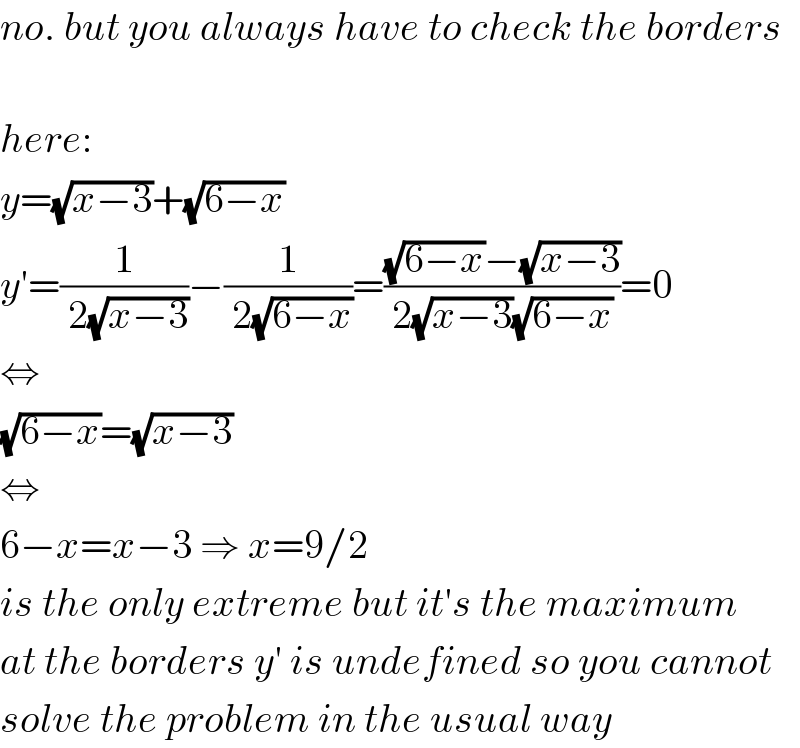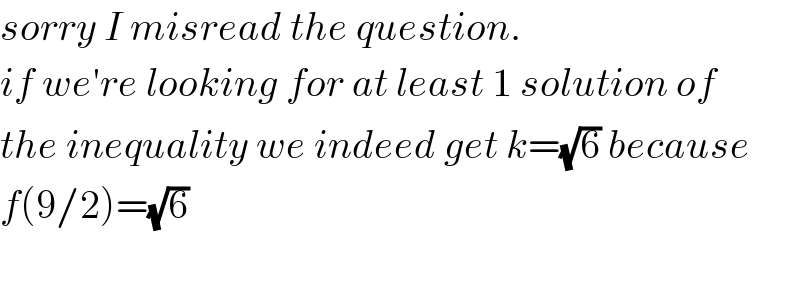
Question Number 110673 by Aina Samuel Temidayo last updated on 30/Aug/20

$$ \\ $$$$\mathrm{Let}\:\mathrm{k}\:\mathrm{be}\:\mathrm{a}\:\mathrm{real}\:\mathrm{number}\:\mathrm{such}\:\mathrm{that}\:\mathrm{the} \\ $$$$\mathrm{inequality}\:\sqrt{\mathrm{x}−\mathrm{3}}+\sqrt{\mathrm{6}−\mathrm{x}}\geqslant\mathrm{k}\:\mathrm{has}\:\mathrm{a} \\ $$$$\mathrm{solution}.\:\mathrm{Find}\:\mathrm{the}\:\mathrm{maximum}\:\mathrm{value}\:\mathrm{of} \\ $$$$\mathrm{k}. \\ $$
Answered by Her_Majesty last updated on 30/Aug/20

$${f}\left({x}\right)=\sqrt{{x}−\mathrm{3}}+\sqrt{\mathrm{6}−{x}}\:\Rightarrow\:\mathrm{3}\leqslant{x}\leqslant\mathrm{6} \\ $$$${minima}\:{at}\:{the}\:{borders} \\ $$$${f}\left(\mathrm{3}\right)={f}\left(\mathrm{6}\right)=\sqrt{\mathrm{3}}={k} \\ $$
Commented by Aina Samuel Temidayo last updated on 30/Aug/20

$$\mathrm{Thanks}\:\mathrm{but}\:\mathrm{what}\:\mathrm{do}\:\mathrm{you}\:\mathrm{mean}\:\mathrm{by} \\ $$$$\mathrm{minima}\:\mathrm{at}\:\mathrm{the}\:\mathrm{borders}? \\ $$
Commented by Her_Majesty last updated on 30/Aug/20

$${the}\:{borders}\:{of}\:{definition}\:{my}\:{dear},\:{or}\:{do} \\ $$$${you}\:{see}\:{other}\:{relevant}\:{borders}? \\ $$
Commented by Aina Samuel Temidayo last updated on 30/Aug/20

$$\mathrm{Is}\:\mathrm{minima}\:\mathrm{at}\:\mathrm{the}\:\mathrm{borders}\:\mathrm{true}\:\mathrm{for} \\ $$$$\mathrm{all}\:\mathrm{functions}? \\ $$
Commented by Her_Majesty last updated on 30/Aug/20

$${no}.\:{but}\:{you}\:{always}\:{have}\:{to}\:{check}\:{the}\:{borders} \\ $$$$ \\ $$$${here}: \\ $$$${y}=\sqrt{{x}−\mathrm{3}}+\sqrt{\mathrm{6}−{x}} \\ $$$${y}'=\frac{\mathrm{1}}{\:\mathrm{2}\sqrt{{x}−\mathrm{3}}}−\frac{\mathrm{1}}{\:\mathrm{2}\sqrt{\mathrm{6}−{x}}}=\frac{\sqrt{\mathrm{6}−{x}}−\sqrt{{x}−\mathrm{3}}}{\mathrm{2}\sqrt{{x}−\mathrm{3}}\sqrt{\mathrm{6}−{x}}}=\mathrm{0} \\ $$$$\Leftrightarrow \\ $$$$\sqrt{\mathrm{6}−{x}}=\sqrt{{x}−\mathrm{3}} \\ $$$$\Leftrightarrow \\ $$$$\mathrm{6}−{x}={x}−\mathrm{3}\:\Rightarrow\:{x}=\mathrm{9}/\mathrm{2} \\ $$$${is}\:{the}\:{only}\:{extreme}\:{but}\:{it}'{s}\:{the}\:{maximum} \\ $$$${at}\:{the}\:{borders}\:{y}'\:{is}\:{undefined}\:{so}\:{you}\:{cannot} \\ $$$${solve}\:{the}\:{problem}\:{in}\:{the}\:{usual}\:{way} \\ $$
Commented by Her_Majesty last updated on 30/Aug/20

$${sorry}\:{I}\:{misread}\:{the}\:{question}. \\ $$$${if}\:{we}'{re}\:{looking}\:{for}\:{at}\:{least}\:\mathrm{1}\:{solution}\:{of} \\ $$$${the}\:{inequality}\:{we}\:{indeed}\:{get}\:{k}=\sqrt{\mathrm{6}}\:{because} \\ $$$${f}\left(\mathrm{9}/\mathrm{2}\right)=\sqrt{\mathrm{6}} \\ $$$$ \\ $$
Answered by 1549442205PVT last updated on 30/Aug/20

$$\mathrm{Apply}\:\mathrm{inequality}\:\mathrm{AM}−\mathrm{GM}\:\mathrm{we}\:\mathrm{have} \\ $$$$\left(\:\sqrt{\mathrm{x}−\mathrm{3}}+\sqrt{\mathrm{6}−\mathrm{x}}\right)^{\mathrm{2}} \leqslant\left(\mathrm{1}^{\mathrm{2}} +\mathrm{1}^{\mathrm{2}} \right)\left(\mathrm{x}−\mathrm{3}+\mathrm{6}−\mathrm{x}\right)=\mathrm{6} \\ $$$$\Rightarrow\mathrm{0}<\:\sqrt{\mathrm{x}−\mathrm{3}}+\sqrt{\mathrm{6}−\mathrm{x}}\leqslant\sqrt{\mathrm{6}}.\left(\mathrm{1}\right)\mathrm{Hence},\mathrm{put} \\ $$$$\mathrm{f}\left(\mathrm{x}\right)=\:\sqrt{\mathrm{x}−\mathrm{3}}+\sqrt{\mathrm{6}−\mathrm{x}} \\ $$$$\mathrm{Take}\:\mathrm{k}=\sqrt{\mathrm{6}}\:\mathrm{then}\:\mathrm{the}\:\mathrm{inequality} \\ $$$$\:\sqrt{\mathrm{x}−\mathrm{3}}+\sqrt{\mathrm{6}−\mathrm{x}}\geqslant\mathrm{k}\:\mathrm{has}\:\mathrm{at}\:\mathrm{least}\:\mathrm{one}\:\mathrm{root} \\ $$$$\mathrm{k}=\sqrt{\mathrm{6}}\:\mathrm{is}\:\mathrm{greatest}\:\mathrm{value}\:\mathrm{because}\:\mathrm{if} \\ $$$$\exists\mathrm{k}_{\mathrm{0}} >\sqrt{\mathrm{6}}\:\mathrm{such}\:\mathrm{that}\: \\ $$$$\:\sqrt{\mathrm{x}−\mathrm{3}}+\sqrt{\mathrm{6}−\mathrm{x}}\geqslant\mathrm{k}_{\mathrm{0}} \mathrm{then}\:\mathrm{this}\:\mathrm{inequality} \\ $$$$\mathrm{has}\:\mathrm{no}\:\mathrm{root}\:\mathrm{due}\:\mathrm{to}\:\left(\mathrm{1}\right) \\ $$
